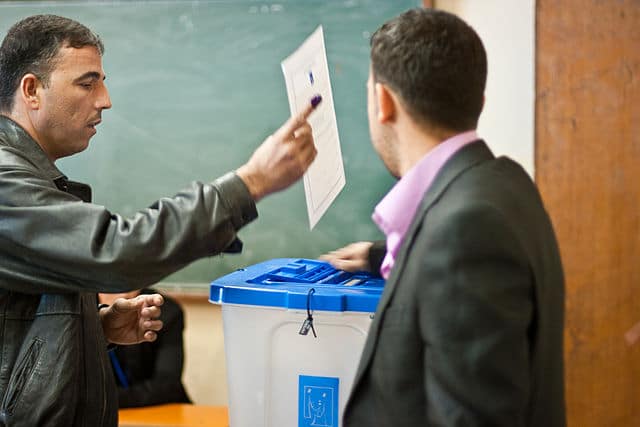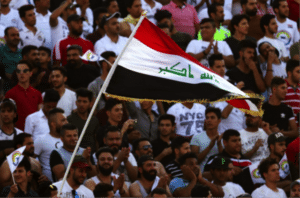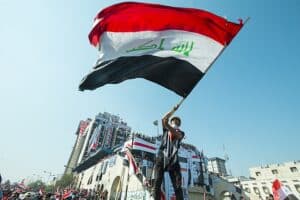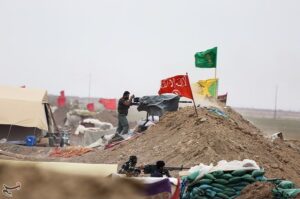Photo: Voting in Iraq – Wikimedia Commons
On 18 December, Iraq voted for 15 of its 18 provincial councils. 285 seats were to be appointed. It were the first provincial elections since 2013. The outcome of the elections is decisive in shaping power dynamics in Iraq. The influence of Iran-aligned parties has been growing over the last years and is expected to be translated to the provincial level as well.
Turnout
23 million people were eligible to cast their vote, of which 16 million registered. Eventually, 41% of registered voters turned out (6.6 million). This is low, but a higher turnout than during the parliamentary elections in 2021. Voters attendance ranged from 21 to 66%, numbers that seriously raise the issue of representation. Turnout was especially low in strongholds of Muqtada al-Sadr, which boycotted the election. Its followers adhered and did most probably not vote. Al-Sadr claims the successful boycott weakens the legitimacy of the elections. Also among young people turnout has been particularly low. The 2019 Tishreen protests have led to nothing in the last years and trust is on a record low.
Results
As expected, the ruling Shiite bloc took the win in many of the provinces, especially in the south. The provinces of Wasit, Karbala, Diwaniyah, Najaf, Maysan, Muthana, Dhi Qar, Babil and Qadisiyah all fell – to a greater and lesser extent – in the hands of the Shiite Coordination Framework (CF) and allies. In the winning provinces, the separate parties that make up the CF ran independently but had said beforehand that they would govern together after the vote. Preliminary results show that out of 285 council seats, 101 go to the CF alliance, more than any other participating bloc. The CF consisted of three lists: We Build Coalition led by the Badr Organisation (43 seats), State of Law coalition headed by former Prime Minister Nouri al-Maliki (35 seats), and State Forces Coalition including Ammar al-Hakim and former Prime Minister Haidar al-Abadi (23 seats).
In Baghdad and the western Anbar province, the Sunni Taqadum Alliance, led by Mohammed al-Halbousi – the ousted parliament speaker – won and secured 22 seats in total.
Disputed areas
In the disputed areas – close to the autonomous Kurdistan Regional Government – of Kirkuk, Diyala and Salahaddin, Kurdish parties came out largest but were not able to claim the majority of the vote. Patriotic Union of Kurdistan (PUK) won in Kirkuk, Diyala and Salahaddin. The Kurdistan Democratic Party (KDP) came out second in Diyala and third in Kirkuk after the Arab Alliance. In Kirkuk all Kurdish parties combined gathered 40% of the votes. The fourth disputed area, Nineveh, was not won by a Kurdish party – KDP came out second – but by the Nineveh For Its People list, led by Najim al-Jubouri, a general and current governor of Nineveh. In total, Kurdish parties will take only 7 seats. While Shiite parties decided to run on joint lists in these provinces, the Kurdish parties did not and are expected to have lost potential seats as a result of that decision.
A close eye was kept on Kirkuk, where historic tensions between Arab, Kurdish and Turkmen communities could flare up again. Kurdish parties collected about 217.000 votes (40%), compared to 203.000 for Arab parties and 93.000 votes for Turkman parties. Of all provinces, turnout was highest in Kirkuk – 66%. The small difference between Kurdish and Arab parties amid the high turnout show that the province is strongly divided and differences are reemphasised.
Electoral process
Security has been tight due to fear of violence – major incidents were prevented. In Najaf, a grenade was thrown at a polling station but caused no injuries. The Independent High Electoral Commission (IHEC) has received 118 complaints of alleged violations during the elections. Although, no so-called ‘red complaints’ were recorded so no major case of questioning the results is expected.
Implications
The provincial councils had been dissolved in response to the 2019 anti-government protests. The provincial councils will be operable again now they have received mandate after years. This mandate is serious as the councils have the power to appoint governors and determine budgets for sectors like education, health and transport. PM al-Sudani hopes the trust in the winning parties “quickly transforms into tangible public service, contributing to the implementation of government plans for development, reconstruction, and service provision”. CF’s influence will be strengthened throughout the country. Apart from the provinces where they won, the alliance will be needed in centre and northern provinces too, to form majorities – all provinces rely on their support.
The rule of the CF has been reconfirmed and its position in Iraqi politics is bolstered. The results pose a, for them, positive outlook on the parliamentary elections in 2025 where the Shiite alliance is expected to win again. The result is a positive sign for Prime Minister Mohammed al-Sudani as well, who depends on the backing of the CF.



